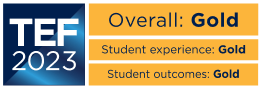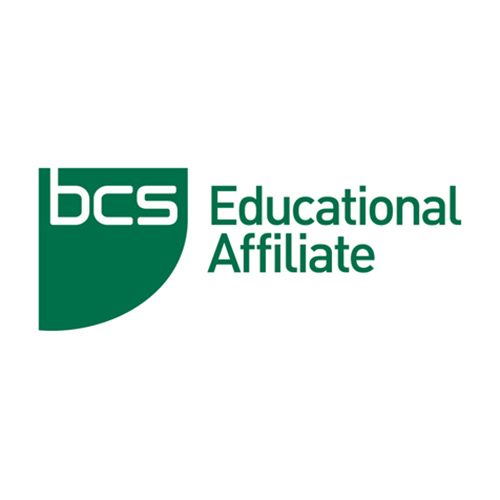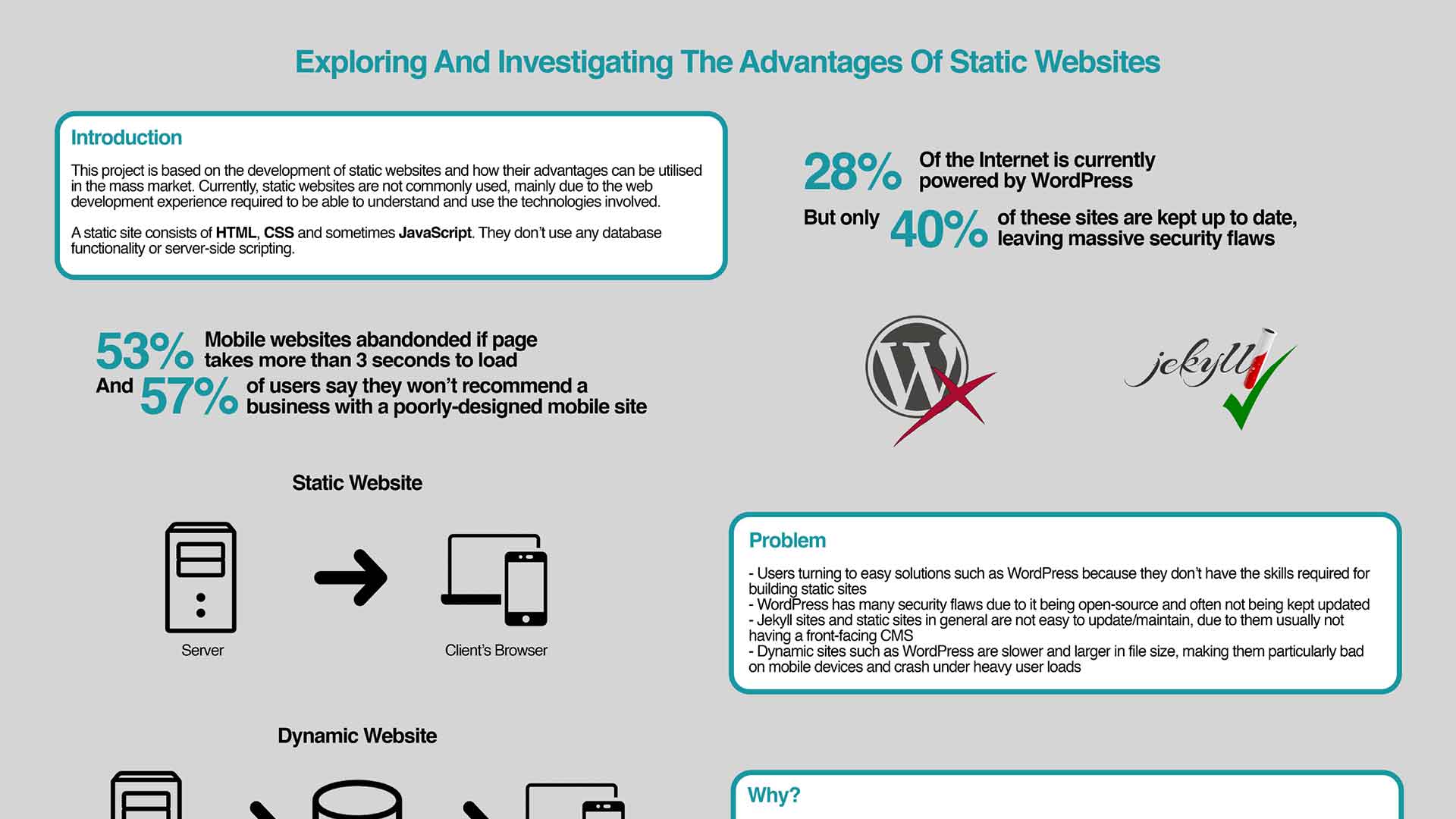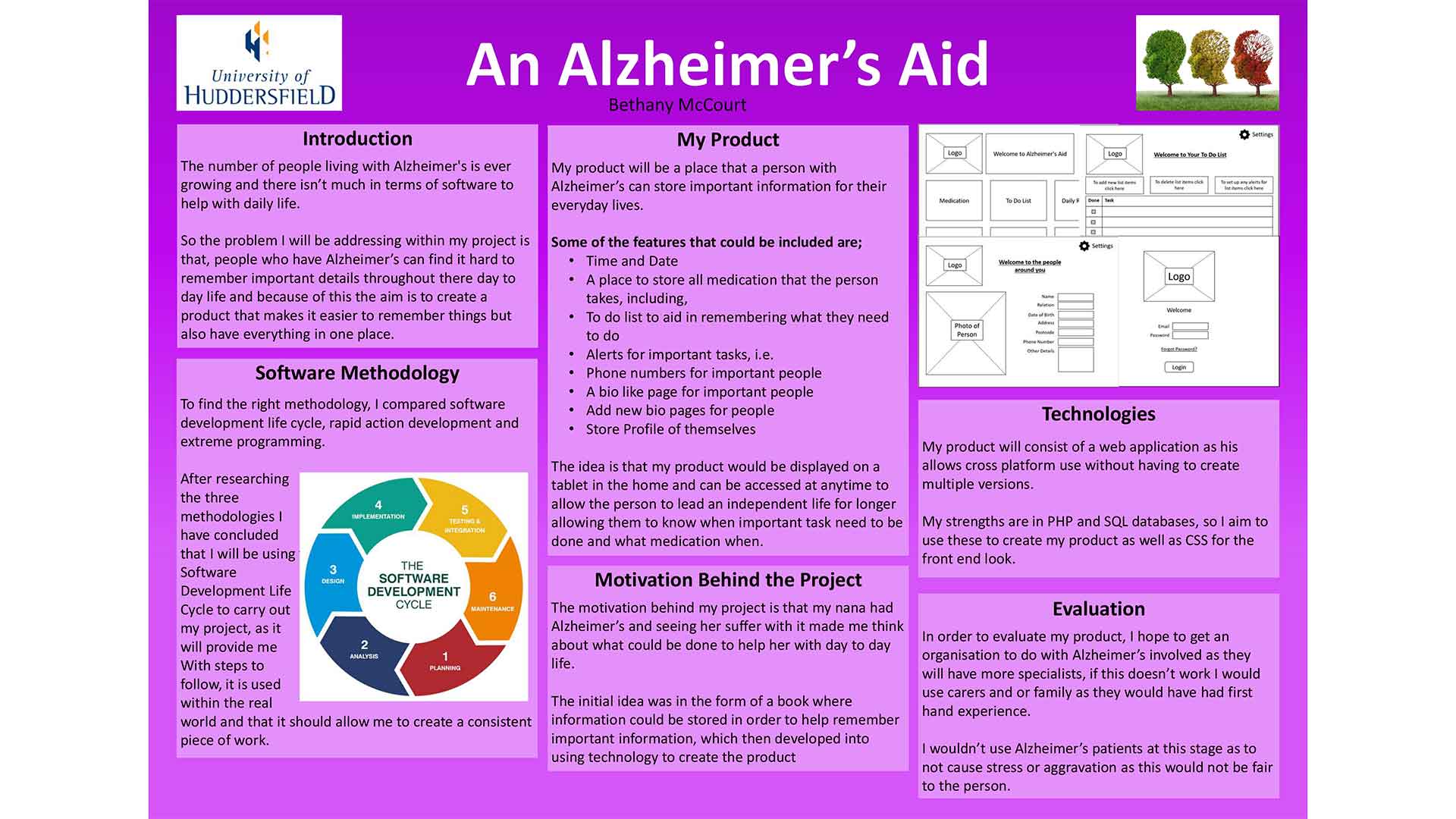Information Technology BSc(Hons)
Start Dates
21 September 2026
Duration
3 years full-time 4 years inc. placement year
UCAS Tariff
120-112
Overview
Why choose Huddersfield for this course?
- Gain a strong grounding in IT, learning to design and implement information systems while exploring data, web, and interface development.
- Utilise our excellent industry contacts to take a placement year, gaining real experience, building contacts, and applying skills professionally.
- This course is accredited by the British Computer Society (BCS), setting you on the path to Chartered IT Professional and Chartered Engineer status.
Accreditation and Professional Links
Recognised connections to give you an extra edge when you graduate. Read More
This course is designed to give you the knowledge and skills to help organisations identify their IT needs, and then design, produce, and operate computer-based information systems.
You could embark on a career in computer-based technologies, integrating communications with computer networks to benefit organisations in the public or private sector.
Throughout this IT degree, you’ll be supported by our team to develop your creativity and imagination, with our aim being to help you pursue a career within IT. Studying IT doesn't just lead to a career, it's a gateway to improved prospects, increased earning potential, and the ability to shape your own path in the ever-evolving landscape of information technology. The top five job titles advertised in the UK for graduate roles associated with Information Technology courses are Project Coordinator, Security Engineer, System Engineer, IT Support Engineer and Network Engineer.*
This subject area ranked top in the country for student voice in the National Student Survey 2025, as well as being second overall for learning resources. What's more, we ranked 8th in the UK for Information Technology & Systems in the 2026 Complete University Guide.
*Lightcast data extracted from Graduate Career Explorer – job postings from Dec 2023 to Nov 2024 showing jobs advertised associated with a selection of relevant graduate roles.
Career opportunities after the course *
Project Coordinators
Security Engineers
Solutions Architects
Systems Engineers
Data Engineers
*Lightcast
Entry Requirements
BBB-BBC at A Level.
DMM in BTEC Level 3 Extended Diploma.
120-112 UCAS tariff points from a combination of Level 3 qualifications.
Access to Higher Education Diploma in a subject that is relevant to the course with 45 Level 3 credits at Merit or above.
Merit at T Level.
120-112 UCAS tariff points from International Baccalaureate qualifications.
Entry is also possible from the Engineering Foundation Year. To progress onto this course from the Foundation Year you must pass all modules and achieve an average mark of 40% or above.
In addition you must have GCSE English Language or Literature and Maths at grade 4 or above, or grade C or above if awarded under the previous GCSE grading scheme.
If your first language is not English, you will need to meet the minimum requirements of an English Language qualification. The minimum for IELTS is 6.0 overall with no element lower than 5.5, or equivalent. Read more about the University’s entry requirements for students outside of the UK on our International Entry Requirements page.
Other suitable experience or qualifications will be considered. We consider all applications on an individual basis.
For further information please see the University's minimum entry requirements.
Course Details
This course offers an optional one-year work placement after Year 2.
You will also choose two optional modules in this year. The current optional modules are:
Modern enterprises often derive significant business insight from applying advanced analytical techniques to massive volumes of data. In this module you will critically evaluate the technologies, techniques, and issues involved in the development and delivery of advanced business intelligence and data analytics systems, particularly those designed to achieve business intelligence and insight using “Big Data”, i.e., a wide variety of data that is high volume and/or high speed. You will be provided with one or more technical environments in which to develop your skills in the design and development of suitable business intelligence tools, and offered a wide range of large, complex and/or dynamic data sets which help illustrate the key technical challenges of dealing with advanced analytics. Learners will be provided with one or more technical environments in which to develop their skills in the design and development of suitable business intelligence tools, and they will be offered a wide range of large, complex and/or dynamic data sets which help illustrate the key technical challenges of dealing with advanced analytics.
For more information on when and how we update our modules please see the ‘Legal Information’ section below.
Teaching and Assessment
Discover what to expect from your tutor contact time, assessment methods, and feedback process.
Global Professional Award
At Huddersfield, you’ll study the award-winning Global Professional Award (GPA) alongside your degree* — so you’re ready for the career you want, whatever subject you choose.
Placements
You’ll have the opportunity to complete an optional placement year (minimum 36 weeks, up to 48 weeks) in Year 3, either in the UK or abroad. This is your chance to gain hands-on experience, develop industry-specific skills, and enhance your career prospects. You’ll apply what you’ve learned in a real-world setting while exploring potential career paths.
Your placement will be monitored, and you’ll be assessed on your achievements, helping you refine your professional skills and prepare for your final year. Our Placement Unit and academic staff have strong industry connections and will support you throughout the process, from finding a placement to making the most of your experience. Students have previously secured placements with companies such as Boohoo, Kirklees Council and Thornton and Ross.
I was fortunate to get a placement at Leeds Council as a web developer where I worked on a number of complex applications used by the public. My placement taught me a range of skills which furthered my understanding on fundamental programming concepts learnt in my 1st and 2nd years of my course.
- Lukas Hutton
Information Technology BSc(Hons), Web Developer at Leeds City Council
Your Career
Previous graduates from courses in this subject area have gone on to work in a variety of roles such as software engineer, server and storage analyst, senior developer, research software development engineer, systems security engineer, IT Analyst and business analyst in organisations including BBC, West Yorkshire Police, Hermes, Microsoft, LLoyds, BT and Amazon UK.**
Additionally, you may gain skills that are transferable to other industries and may be able to pursue any career that requires a good honours degree. You could go on to further study and the University has many options available for postgraduate study (including postgraduate teacher training) and research which may interest you.
**Source: LinkedIn
75%
Percentage of graduates from this course who are in work and/or further study within fifteen months of graduation.
* (HESA Graduate Outcomes 21/22, UK Domiciled).
The facilities at Huddersfield are really good, they're always updating the software and hardware available to students. My experience as a student at Huddersfield was brilliant, I couldn't fault it, I made lots of new friends and I settled in really easily.
- Wes Weaver
UX Architect, Perform
Fees and Finance
This information is for Home students applying to study at the University of Huddersfield in the academic year 2026/27.
Please note that tuition fees for subsequent years may rise in line with inflation (RPI-X) and/or Government policy.
From January 2027 the UK government is launching a new student funding system for people starting university education. Read more about the Lifelong Learning Entitlement (LLE).
For detailed information please visit https://www.hud.ac.uk/study/fees/
This information is for international students applying to study at the University of Huddersfield in the academic year 2026/27.
Please note that tuition fees for subsequent years may rise in line with inflation (RPI-X) and/or Government policy.
For detailed information please visit https://www.hud.ac.uk/international/fees-and-funding/
Home
The tuition fee for a placement year is £1000. If you go on work experience or work placement, you will need to fund your own travel and/or accommodation costs to and from the placement. Please be aware that if your placement is outside of the UK, you will still be responsible for your travel and living expenses and may need to consider issues like health care and insurance costs.
International
The tuition fee for a placement year is £3,300. If you go on work experience or work placement, you will need to fund your own travel and/or accommodation costs to and from the placement. Please be aware that if your placement is outside of the UK, you will still be responsible for your travel and living expenses and may need to consider issues like health care and insurance costs.
Optional short field trips e.g. one day, are sometimes also arranged. Previous field trips have included Digital Skills Festival - Talent Day, Bletchley Park and National Museum of Computing. The costs of these field trips are heavily subsidised by the school but can sometimes incur a nominal cost and/or deposit of between £5 and £40 depending on the trip.
Scholarships and Bursaries
Discover what additional help you may be eligible for to support your University studies.
Tuition Fee Loans
Find out more about tuition fee loans available to eligible undergraduate students.
What’s included in your fee?
We want you to understand exactly what your fees will cover and what additional costs you may need to budget for when you decide to become a student with us.
If you have any questions about Fees and Finance, please email the Student Finance Team.
Gallery
Explore More
Why Hud
Explore the unique opportunities and resources that make our institution a top choice for students seeking a well-rounded and future-focused education.
More Info
Careers support
We know you’re coming to university to study on your chosen subject, meet new people and broaden your horizons. However, we also help you to focus on life after you have graduated to ensure that your hard work pays off and you achieve your ambition.
Find out more about careers supportStudent support
At the University of Huddersfield, you’ll find support networks and services to help you get ahead in your studies and social life. Whether you study at undergraduate or postgraduate level, you’ll soon discover that you’re never far away from our dedicated staff and resources to help you to navigate through your personal student journey.
See our support servicesTeaching Excellence
Great teaching is engaging and inspiring — it helps you reach your full potential and prepares you for the future. We don’t just teach well — we excel — and we have the awards and recognition to prove it.
Find out moreInspiring Academics
Our researchers carry out world-leading work that makes a real difference to people’s lives. Staff within the Department of Computer Science may teach you on this course.
Find out more about our staffResearch Excellence
You’ll be taught by staff who want to support your learning and share the latest knowledge and research.
Find out moreAccommodation
Looking for student accommodation? Huddersfield has you covered. HudLets has a variety of accommodation types to choose from, no matter what your preference. HudLets is the University’s approved accommodation service, run by Huddersfield Students’ Union.
Take a look at your optionsFurther Study
If you want to continue your learning beyond your undergraduate degree, there is a range of financial support available for postgraduate study, including discounts for Huddersfield graduates.
Discover postgraduate coursesLegal information
When you enrol as a student of the University, your study and time with us will be governed by our terms and conditions, Handbook of Regulations and associated policies. It is important that you familiarise yourself with these as you will be asked to agree to them when you join us as a student. You will find a guide to the key terms here, along with the Student Protection Plan.
Although we always try and ensure we deliver our courses as described, sometimes we may have to make changes for the following reasons:
Changes to a course you have applied for but are not yet enrolled on
If we propose to make a major change to a course that you are holding an offer for, then we will tell you as soon as possible so that you can decide whether to withdraw your application prior to enrolment. We may occasionally have to withdraw a course you have applied for or combine your programme with another programme if we consider this reasonably necessary to ensure a good student experience, for example if there are not enough applicants. Where this is the case we will notify you as soon as reasonably possible and if you are unhappy with the change we will discuss with you other suitable courses we can transfer your application to. If you do not wish to transfer to another course with us, you may cancel your application and we will refund you any deposits or fees you have paid to us.
Changes to your course after you enrol as a student
Changes to option modules
Where your course allows you to choose modules from a range of options, we will review these each year and change them to reflect the expertise of our staff, current trends in research and as a result of student feedback or demand for certain modules. We will always ensure that you have an equivalent range of options to that advertised for the course. We will let you know in good time the options available for you to choose for the following year.
Major changes
We will only make major changes to non-optional modules on a course if it is necessary for us to do so and provided such changes are reasonable. A major change is a change that substantially changes the outcomes, or a significant part of your course, such as the nature of the award or a substantial change to module content, teaching days (part time provision), type of delivery or assessment of the core curriculum. For example, it may be necessary to make a major change to reflect changes in the law or the requirements of the University’s regulators or a commissioning or accrediting body. We may also make changes to improve the course in response to student, examiners’ or other course evaluators’ feedback or to ensure you are being taught current best practice. Major changes may also be necessary because of circumstances outside our reasonable control, such as a key member of staff being unable to teach due to illness, where they have a particular specialism that can’t be adequately covered by other members of staff; or due to pandemics, other disasters (such as fire, flood or war) or changes made by the government.
Major changes would usually be made with effect from the next academic year, but may happen sooner in an emergency. We will notify you as soon as possible should we need to make a major change and will consult with affected groups of students and any changes would only be made in accordance with our regulations. If you reasonably believe that the proposed change will cause you detriment or hardship we will, if appropriate, work with you to try to reduce the adverse effect on you or find an appropriate solution. Where an appropriate solution cannot be found and you let us know before the change takes effect you can cancel your registration and withdraw from the University without liability to the University for any additional tuition fees. We will provide reasonable support to assist you with transferring to another university if you wish to do so and you may be eligible for an exit award depending on how far through your course you are.
In exceptional circumstances, we may, for reasons outside of our control, be forced to discontinue or suspend your course. Where this is the case, a formal exit strategy will be followed in accordance with the student protection plan.
The Office for Students (OfS) is the principal regulator for the University.














